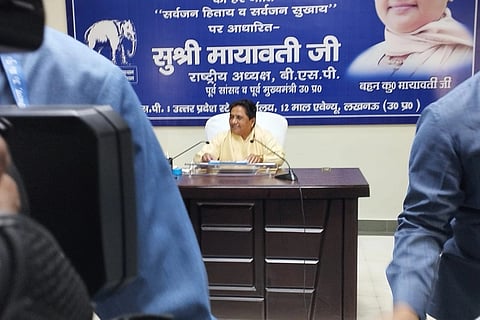
New Delhi: The Bahujan Samaj Party (BSP), led by Mayawati, is grappling with a severe existential crisis. The party’s political fortunes have been dwindling with each election, particularly since 2014, as the Dalit votes seem to have shifted significantly towards the Bharatiya Janata Party (BJP) and the Opposition Samajwadi Party (SP). Even the BSP’s core Jatav voter base appears to be drifting away.
Throughout the prolonged Lok Sabha election, political analysts were perplexed by Mayawati’s strategy: was it aimed at benefiting the BJP — splitting votes between the BJP and the SP, or was it an attempt to ensure the BSP’s survival?
The party’s failure to secure even a single seat in the current Lok Sabha elections, in contrast to the 10 seats won in alliance with the SP in the previous elections, raises pressing questions about its future viability.
According to the Election Commission's latest trends, the BSP's vote share has plummeted to 9 percent in Uttar Pradesh, and the party has not won any of the 17 SC reserved constituencies in the state. The BJP's share in SC-reserved seats has also fallen from 15 in 2019 to 7 this election.
The 2024 election results highlight the BSP's ongoing decline, which began after it was ousted from power in the 2012 Uttar Pradesh assembly polls. In 2019, the party secured 19 percent of the vote share and won 10 Lok Sabha seats through its alliance with the SP. However, its vote share has steadily decreased with each subsequent election.
In the 2007 UP assembly election, the BSP achieved a landmark victory, winning 206 out of 403 seats and securing around 31 percent of the vote. By 2012, its tally dropped to 80 seats with a 26 percent vote share. In 2017, the party won only 19 seats, although its vote share slightly dipped to 22.23 percent. The 2022 assembly elections marked the BSP's worst performance to date, with just one seat and a 13 percent vote share.
In the 2009 Lok Sabha elections, buoyed by its 2007 state election success, the BSP won 20 seats and secured a 27 percent vote share in UP. However, by 2014, the party's tally dropped to zero, despite a 20 percent vote share. The 2019 alliance with the SP brought a temporary boost, but this year's results reveal the fleeting nature of that improvement.
The BSP has been in a state of continuous decline since 2012. The party's vote share has been decreasing consistently, and any revival seems unlikely. From a party with a 25-27 percent vote share, it has fallen to 12 percent in the last assembly elections, losing many seats with only 10 percent votes.
Experts identify several reasons for the BSP's decline: the failure to develop a second-rung leadership, inadequate investment in organizational strength and lack of ideological commitment.
Additionally, the BSP has failed to address the aspirations of the rising Dalit middle class, which the BJP has successfully engaged.
Since 2014, non-Jatav Dalit votes have shifted significantly to the BJP, which, along with the RSS, has integrated Dalits into the Hindu fold through targeted social and cultural outreach.
The BSP faces an existential threat common to caste or identity-based parties in a single-party dominated system. The period of fragmented or coalition politics from 1989 to 2014 allowed various caste-based parties to thrive. That era has ended.
Badri Narayan, a political analyst and author, suggests that independent Dalit politics may have reached its end. "In this neoliberal era, Dalit aspirations have surged," he says. "The BSP has failed to capture that."
Even the Jatav vote-bank, constituting around 12 percent of UP's population, seems to be abandoning the BSP.
You can also join our WhatsApp group to get premium and selected news of The Mooknayak on WhatsApp. Click here to join the WhatsApp group.